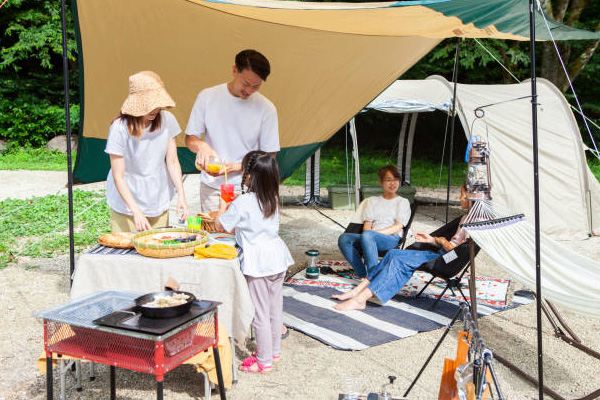Is traveling an essential part of a well-rounded life?
Discover how travel goes beyond exploration, enriching your life through new perspectives, cultural immersion, personal growth, and resilience Explore the essential role of travel in achieving a well-rounded and fulfilling life
Traveling is more than just exploring new places; it's a transformative experience that enriches your life in countless ways. It's about embracing the unknown, gaining new perspectives, and fostering personal growth. In this article, we will delve into the significance of travel in achieving a well-rounded life. We'll explore how it broadens horizons, fosters cultural enrichment, and contributes to self-discovery, resilience, and adaptability. Let's embark on a journey to understand why travel is a vital component of a fulfilling and holistic life.

The Benefits of Travel
1. Broadening Horizons through Travel
Travel is a transformative experience that broadens horizons in various ways. It offers individuals a unique opportunity to explore new places, interact with people from diverse backgrounds, immerse themselves in different cultures, and even learn new languages. Here's a more in-depth look at how travel accomplishes these objectives:
The Exploration of New Places
One of the most obvious ways travel broadens horizons is by allowing individuals to explore new places. Whether it's a bustling metropolis, a serene natural landscape, or a remote village, each destination offers a unique perspective on the world. Travelers get to witness the beauty of nature, the architectural marvels of human civilization, and the vastness of cultural diversity.
Meeting People from Different Walks of Life
Travel provides the invaluable opportunity to interact with people from diverse walks of life. Whether you're striking up a conversation with a local shopkeeper, sharing a meal with fellow travelers, or participating in a cultural exchange, these interactions offer a window into different worldviews. Conversations and friendships formed during travel can challenge preconceptions and broaden one's understanding of the human experience.
Cultural Immersion
One of the most enriching aspects of travel is cultural immersion. When you travel, you have the chance to experience a culture in a deeply personal way. This can involve trying the local cuisine, participating in traditional ceremonies, and understanding the customs and rituals of the places you visit. Cultural immersion allows you to gain a profound appreciation for the traditions and practices that define a particular culture.
Learning New Languages
Language is a powerful tool for broadening horizons. Travel often requires communication in foreign languages, and learning even a few key phrases can greatly enhance the travel experience. Becoming proficient in a new language is an accomplishment that not only facilitates communication but also provides insights into the cultural nuances and unique expressions of a region. Language learning fosters a deeper connection with the places you visit.
2. Cultural Enrichment and Diversity
Travel offers a unique opportunity for cultural enrichment and an exploration of the world's rich diversity. It allows individuals to delve deep into the cultural tapestry of different regions, fostering a deeper appreciation of art, history, cuisine, and more. Here's a more comprehensive look at how travel contributes to cultural enrichment and the celebration of diversity:
Appreciating Different Art Forms
Travel exposes you to a wide array of art forms. In various destinations, you can explore local art galleries, sculptures, music, dance, and more. Each culture's artistic expression reflects its unique history, values, and creative spirit. This exposure to diverse art forms can be a profound source of inspiration and cultural enrichment.
Understanding History and Heritage
Cultural enrichment through travel involves exploring the historical sites, museums, and landmarks that tell the story of a region's past. Whether it's visiting ancient ruins, touring a medieval castle, or walking through a museum filled with historical artifacts, each experience provides insights into the cultural heritage of a place. Understanding history deepens your appreciation of the world's cultural diversity and the legacy of different societies.
Tasting the World's Flavors
One of the most delightful aspects of cultural enrichment is savoring local cuisine. Traveling allows you to indulge in the flavors and aromas of different regions. Whether it's sampling street food in Bangkok, enjoying a traditional Italian meal, or sipping tea in Morocco, food is a gateway to a culture's soul. Food experiences become memories of travel that capture the essence of a place and its people.
Fostering Tolerance and Open-Mindedness
Experiencing different cultures encourages tolerance and open-mindedness. As you travel, you're exposed to varying customs, traditions, and ways of life. This exposure fosters a more inclusive and accepting worldview. It teaches individuals to appreciate the beauty of diversity and respect for others, breaking down stereotypes and preconceptions.
Challenges of Travel
1. Overcoming Travel Obstacles
While travel is an enriching experience, it often comes with its fair share of challenges. From language barriers to navigation issues and unforeseen disruptions, overcoming these obstacles is an integral part of the travel journey. Let's explore these obstacles and how travelers can navigate them:
Language Barriers
One of the most common challenges faced by travelers is the language barrier. Communicating in a foreign language can be daunting, but it's also an opportunity for growth. Learning a few basic phrases in the local language can go a long way in bridging this gap. Additionally, translation apps and phrasebooks can be invaluable tools for travelers seeking to communicate effectively.
Navigation Difficulties
Navigating unfamiliar terrain can be challenging. Getting lost in a new city or country can be disorienting, but it can also lead to serendipitous discoveries. To mitigate navigation difficulties, travelers can use GPS and mapping apps, carry physical maps, or even ask locals for directions. These experiences can be opportunities for adventure and exploration.
Adapting to Unfamiliar Environments
Adapting to a new environment can be both exciting and challenging. Climate, culture, and daily routines may be very different from what travelers are accustomed to. The key is to remain open and flexible, embracing the differences as part of the travel experience. Pack appropriate clothing, research local customs in advance, and be prepared to step out of your comfort zone.
Handling Travel Stressors
Travel can be stressful, especially when facing unexpected situations like flight delays, lost luggage, or unforeseen events. The ability to manage travel stress is an essential skill. Preparing for contingencies, having a well-organized travel itinerary, and maintaining a positive attitude can make a significant difference. Travel stressors can also be seen as opportunities to demonstrate resilience and adaptability.
2. Dealing with Travel Stress
Travel can be an exciting adventure, but it's not without its share of potential stressors. Managing travel stress is crucial for ensuring a smooth and enjoyable journey. Let's explore various aspects of dealing with travel stress and strategies for a more relaxed and fulfilling travel experience:
Pre-Trip Preparation
The foundation for stress-free travel is laid during the planning and preparation phase. Before the trip, make a checklist, pack essentials, confirm reservations, and familiarize yourself with the destination. Knowing what to expect and being well-prepared can significantly reduce anxiety.
Flexibility and Adaptability
Travel often involves unexpected changes, such as flight delays, weather disruptions, or itinerary adjustments. Being flexible and adaptable is key to managing stress in such situations. Embrace the unpredictability of travel and look for alternative plans when necessary.
Effective Time Management
Poor time management can lead to stress, especially when trying to fit too many activities into a tight schedule. Prioritize the most important experiences, allocate sufficient time for each, and allow for relaxation. A well-balanced itinerary can minimize stress and make travel more enjoyable.
Health and Wellness
Maintaining physical and mental well-being during travel is essential for stress management. Get enough rest, stay hydrated, eat balanced meals, and engage in physical activities like walking or yoga. Additionally, practice stress-reduction techniques such as deep breathing, meditation, or mindfulness to stay centered and calm.
Problem-Solving and Resilience
When challenges arise, approach them as problem-solving opportunities. Whether it's a lost passport, a language barrier, or a missed connection, staying calm and finding solutions is essential. Developing resilience and problem-solving skills while traveling not only reduces stress but also builds confidence and self-reliance.
Support Networks
While traveling, stay connected with family and friends. Share your experiences and concerns with loved ones, whether through calls, messages, or social media. Having a support network can provide emotional support, advice, and a sense of security, reducing feelings of isolation and stress while on the road.
Travel and Personal Growth
1. Self-Discovery through Travel
Travel is not just about exploring new places; it's also an incredible journey of self-discovery. When you step out of your comfort zone and immerse yourself in unfamiliar environments, you have the opportunity to learn more about yourself, your values, and your capabilities. Here's a deeper exploration of how travel fosters self-discovery:
Stepping out of Your Comfort Zone
One of the most transformative aspects of travel is stepping out of your comfort zone. It challenges you to adapt to new environments, interact with different people, and embrace the unknown. In these moments of discomfort, you discover your capacity for resilience and adaptability, gaining confidence in your ability to navigate life's challenges.
Reflecting on Personal Values
Travel often provides a quiet space for self-reflection. As you immerse yourself in different cultures and witness diverse ways of life, you may find yourself questioning your own values, beliefs, and priorities. This introspection can lead to personal growth and a deeper understanding of what truly matters to you.
Building Independence
Travel encourages independence. You're responsible for planning your itinerary, making decisions, and problem-solving along the way. These experiences foster self-reliance and decision-making skills. You become more resourceful and confident in your ability to handle various situations.
Facing Challenges and Adversity
Travel can present unexpected challenges, whether it's a missed flight, a language barrier, or cultural differences. Facing and overcoming these challenges helps you develop resilience. You learn to adapt, find solutions, and persevere in the face of adversity, which can be valuable skills in all aspects of life.
Cultural Exchange and New Perspectives
Engaging with people from different backgrounds and learning about their lives and perspectives can be eye-opening. It encourages you to question your own assumptions and see the world through a different lens. This newfound cultural awareness can enhance your empathy, open-mindedness, and understanding of the complexities of the world.
Setting Personal Goals and Aspirations
Travel often inspires individuals to set new personal goals and aspirations. Whether it's a desire to learn a new language, explore a specific region, or immerse in a particular culture, these travel experiences can ignite a sense of purpose and motivate you to pursue your passions and dreams.
2. Building Resilience and Adaptability
Travel is a remarkable teacher when it comes to building resilience and adaptability. It thrusts individuals into unfamiliar situations, requiring them to navigate through challenges and uncertainties. This journey fosters personal growth and equips travelers with valuable life skills. Let's delve deeper into how travel contributes to building resilience and adaptability:
Navigating Unfamiliar Environments
One of the primary ways travel builds resilience and adaptability is by placing individuals in unfamiliar environments. Whether it's exploring a bustling city, a remote village, or a pristine natural setting, each new location presents unique challenges and opportunities. Navigating these environments encourages adaptability as you learn to acclimate to different surroundings.
Dealing with Unexpected Situations
Travel frequently involves encountering unexpected situations, such as flight delays, canceled reservations, or language barriers. These situations require quick thinking and problem-solving. The ability to handle unexpected circumstances with composure and creativity is a testament to one's adaptability and resilience.
Managing Cultural Differences
Interacting with people from different cultures exposes travelers to diverse perspectives and customs. Learning to respect and adapt to these differences is a valuable skill. It fosters cross-cultural communication, open-mindedness, and a deeper appreciation of the world's cultural diversity.
Building Confidence through Independence
Travel encourages independence as you plan and execute your journey. It boosts your confidence in making decisions, solving problems, and navigating unfamiliar territory. The sense of self-reliance developed during travel can carry over into other aspects of life, making you more adaptable and resilient in various situations.
Embracing the Unknown
Travel often requires embracing the unknown. It pushes individuals out of their comfort zones and encourages them to take calculated risks. Facing the unknown with courage can lead to personal growth and increased adaptability. It teaches that change and uncertainty are part of life's journey.
Resilience in the Face of Challenges
Resilience is the ability to bounce back from setbacks and adversity. Travel challenges, such as getting lost, dealing with cultural misunderstandings, or coping with unexpected illnesses, provide opportunities to develop resilience. Overcoming these challenges during travel builds the mental and emotional strength needed to overcome life's obstacles.
Travel as an Educational Experience
1. Learning Opportunities Abroad
Traveling abroad offers a wealth of learning opportunities that extend far beyond the confines of a classroom. It provides an immersive and hands-on education, allowing individuals to gain new knowledge, perspectives, and life skills. Here's a deeper exploration of how travel becomes a valuable source of learning:
Exploring History and Heritage
One of the most obvious learning opportunities while traveling is the chance to explore the history and heritage of different regions. Visiting historical sites, museums, and cultural landmarks allows you to gain a deeper understanding of the world's past. It's a firsthand encounter with the stories, achievements, and legacies of various civilizations.
Language and Cultural Understanding
Traveling abroad exposes individuals to different languages and cultures. Learning a few key phrases in the local language can facilitate communication and enhance the travel experience. Moreover, cultural immersion through interactions with locals and participation in traditional customs and ceremonies deepens cultural understanding and appreciation.
Food and Cuisine Exploration
Food is a delightful gateway to learning while traveling. Sampling local cuisine is an opportunity to explore different flavors, ingredients, and culinary traditions. It's a sensory experience that teaches you about a culture's history, geography, and the role of food in society.
Environmental and Geographic Awareness
Travel often takes you to unique natural settings, whether it's tropical rainforests, arid deserts, or pristine beaches. These environments provide opportunities to learn about diverse ecosystems, geographical features, and environmental conservation. It fosters an appreciation for the planet's natural beauty and the importance of preserving it.
Cultural Exchange and Social Insights
Interacting with people from different backgrounds fosters cultural exchange and social insights. It challenges stereotypes and preconceptions, promoting empathy and cross-cultural communication. Travel allows you to gain insights into social dynamics, human behavior, and the ways different societies function.
Personal Growth and Independence
Travel encourages personal growth and independence. It challenges you to step out of your comfort zone, make decisions, and adapt to new situations. This journey of self-discovery leads to increased self-confidence and self-reliance. It's a valuable form of education that goes beyond textbooks and classrooms.
Perspectives on Global Issues
Travel broadens your perspective on global issues. It exposes you to varying viewpoints and real-world challenges faced by different communities. Witnessing these challenges firsthand can inspire a sense of responsibility and a desire to contribute to positive change on a global scale.
2. Gaining New Perspectives
Traveling has the remarkable ability to open your eyes to new perspectives on life, culture, and the world as a whole. It encourages you to see beyond your own experiences and challenges your preconceptions. Here's a deeper exploration of how travel helps individuals gain new and broader perspectives:
Cultural Immersion
One of the most significant ways to gain new perspectives is through cultural immersion. By experiencing the daily lives, customs, and traditions of other cultures firsthand, you gain a deeper understanding of the values and beliefs that shape people's lives. It teaches you to appreciate and respect the richness of diversity.
Interacting with Diverse Communities
Travel exposes you to a wide array of communities, from bustling metropolises to remote villages. Interacting with people from different backgrounds allows you to learn about their unique perspectives, challenges, and ways of life. This firsthand experience challenges stereotypes and encourages empathy and open-mindedness.
Language and Communication
Language is a key to understanding different perspectives. Learning even a few basic phrases in a local language can facilitate communication and break down barriers. It enables you to engage in meaningful conversations and connect on a deeper level with people from diverse backgrounds.
Exploration of Varied Landscapes
Travel often takes you to diverse landscapes, from mountains to deserts, forests to beaches. Each environment provides a different perspective on the natural world and the beauty of the Earth. It fosters an appreciation for the planet's geographical diversity and the need for environmental preservation.
Witnessing Social and Economic Realities
Travel exposes you to varying social and economic realities. You may witness wealth disparities, poverty, or the effects of social and political systems in different regions. These experiences provide insights into the challenges and opportunities faced by different communities, sparking a desire for social justice and change.
Global Awareness and Current Issues
Travel broadens your awareness of global issues. It allows you to see how different regions are affected by global challenges such as climate change, migration, and cultural preservation. Witnessing these issues firsthand can inspire a sense of responsibility and a desire to contribute to solutions on a global scale.
Critical Thinking and Problem-Solving
Travel often requires you to think critically and solve problems on the spot. This encourages a proactive approach to new challenges and the development of valuable problem-solving skills. It broadens your perspective on how to adapt and thrive in different situations, enhancing your overall problem-solving abilities.
FAQs About the Role of Travel in a Well-Rounded Life
Q1: How does travel contribute to personal growth?
A1: Travel fosters personal growth by pushing individuals out of their comfort zones, challenging them to adapt to new environments, and encouraging them to embrace the unknown. It teaches resilience, independence, and a deeper understanding of oneself and the world.
Q2: What can I learn from exploring different cultures through travel?
A2: Exploring different cultures through travel provides insights into diverse perspectives, values, and ways of life. It encourages cultural immersion, cross-cultural communication, and the development of empathy and open-mindedness.
Q3: How does travel enhance my awareness of global issues?
A3: Travel broadens your awareness of global issues by allowing you to witness how different regions are affected by challenges like climate change, migration, and social disparities. These experiences can inspire a sense of responsibility and a desire to contribute to global solutions.
Q4: Can travel help me build resilience and adaptability?
A4: Yes, travel challenges you to navigate unfamiliar environments, deal with unexpected situations, and manage cultural differences. These experiences build resilience and adaptability by teaching you to overcome obstacles and find creative solutions.
Q5: How can travel inspire personal development and self-discovery?
A5: Travel inspires personal development and self-discovery by encouraging individuals to step out of their comfort zones, reflect on personal values, and set new goals. It leads to increased self-confidence, independence, and a deeper understanding of one's identity and aspirations.










